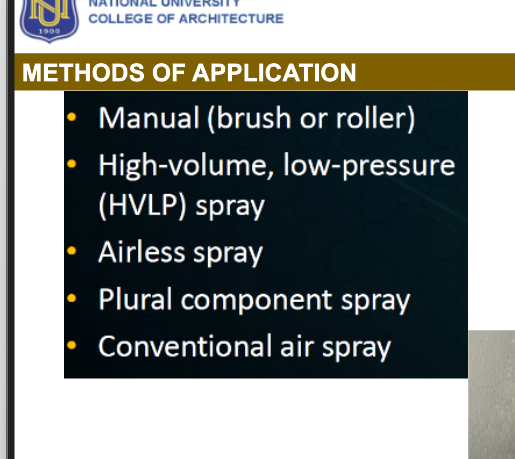Paints & Coatings
1/100
There's no tags or description
Looks like no tags are added yet.
Name | Mastery | Learn | Test | Matching | Spaced | Call with Kai |
|---|
No analytics yet
Send a link to your students to track their progress
101 Terms
paint
defined as a mixture or dispersion of opaque pigments or powders in a liquid or vehicle
4 liters
how many liters for 1 gallon
1 gallon (4 liters)
1 pale of paint is equal to
coatings
include other material that can be considered paint-like in their use as varnishes and inorganic binder
architetyral/trade sales
commonly recognized latex and alkyd paints sold in retail stores
industrial or maintenance
may include anti-corrosive rimers, machinery and industrial enamels and other products that require more specialized application equipment (some trade sales are used in industrial situations)
specialty
are generally very specific in her use application and resistance properties sch as plastic coatings, coil coatings, and resistive coatings
modern classifications of paints
paint
was used for pictorial and decorative purposes i \n the cables of france and space as easily as 15000 bc
natural ores like iron oxide
earliest pigmments of paint
china 6000 bc
who supplemented the earliest pigments (iron oxide/ores) for paint by calcined (fired) mixtures of inorganic compounds and organic pigments
egyptians
by 1500 bc who used dyes such as indigo and madder to make blue and red pigments
linseed oil and zinced xide
zinc oxide
white pigment
primer
“under coat” first coat; improves adhesion (metal, wood, masonry)
finishing coat
final layer for smooth finish (interior/exterior walls)
sanding sealer
filles wood pores (wood panels, furniture)
floor paint
durable for wear (concrete floors)
galvanized iron primer
rust protection for metals (GI sheets, metal gates)
spray paint
smooth application (fixtures, art, machinery)
epoxy paint and enamel paint
used for concrete (floor or wall)
acrylic latex or QDE
USED FOR WOOD
quick drying enamel (QDE)
USED FOR PLYWOOD
ENAMEL PAINT
USED FOR ALUMINUM
ACRYLIC ENAMEL PAINT or QDE
USED FOR GAVLANIZED IRON (GI)
flat latex paint or qde
USED FOR CEILING (GYPSUM BOARD OR PLYWOOD)
latex or qde
used interior walls
acrylic latex or oil based enamel
used for exterior walls
enamel paint or qde
used for doors and windows (wood or metal)
2 coats
primer coats for metal
3 coats
finsihing coats for metal
zinc rich
heat and rustic resistant (bridges, structure steel)
white lead
cheap indoor only (walls and ceilings)
graphite
protects metals (tanks, pieplines)
red lead
thick rust protectrion (steel doors, railings)
micaceous iron oxide
strong barrier layer (industrial steel)
calcium plumbate
for wood and metal joints (window and door frames)
zinc chromate
enhances rust resistance (aircraft, vehicles)
flat
no shine, hides flaws (ceilings, low traffic walls)
satin
low soft shine (bedrooms, offices)
semi-gloss
easy to clean (Kicthens, bathrooms)
gloss
bright and shiny (doors, furnityre)
eggshell
soft, low shine like an eggshell
matt
no shine, smooth finish
gloss
shiny anf rbight
wrinkle/crackle
textured or cracked hook for design
multicolored, flourescent, luminous, iridescent
special effects or colors
acrylic
durbale and water resistant
latex (pva)
water-based, easy to clean
shellac
made from natural resin, glossy
epoxy
tough and chemical resistant
polyurethane
very hard and scratch-resistant
alkyd
oil-based, glossy and durbale
tung/linseed oil
natural oils used for wood
barrier, inhibitive, sacrificial protection
mechanisms of corrosion control by coatings
barrier protection
coating forms a seal over the metal (keeping air and moisture out) - epoxy, polyurethane, alkyd paints in steel structures, pipelines, ships
inhibitive protection
coating contains chemicals that slow down corrosion reactions (paints with zinc chromate, or calcium plumbate) for car bodies, metal windows, roofing systems
sacrificial protection
paint includes a sacrificial metals (eg zinc) that corrodes first, protecting base metal (zinc-rich primer; zinc corrodes instead of steel) bridges, marine structures, industrial steel supports
binders, pigments, solvents, additives
basic components of a paint or coating
binders
also known as resin, polymer, or vehicle
pigments
include the coloring and filling materials
solvents
are the volatile thinners or diluents that evaporate
additive
are materials that are added to modify or improve specific properties related to processing, appearance, or performance
vehicles or binders
glue of paint; help the paint stick and dry
pigments
(color) add color and opacity
titanium dioxide
white pigment
iron oxide
red pigment
resins
(film formers) provide film strength and durability
shellac
natural resin
melamine and fluorocarbon
synthetic resins
additives
(enhancers) dryers and thinners (make paint easier to spread)
natural drying oils
harden by absorbing oxygen
alkyds
most widely used paint vehicle; synthetic resin that are modified with various vegetable oils to produce clear resins that are harder than natural oil
latexes
based on emulsions or various polymers including acrylics, polyvinyl acetate; easy to apply, dry quickly, have no solvent odor, and application tools are easily cleaned
epoxy and epoxy polyester
addition of catalyst to the liquid epoxy just before application
polyurethanes
produce especially abrasion-treatment, fast-hardening coatings
vinyl solutions
solutions of polyvinyl chloride and vinyl esters dry rapidly and are build up by successive, sprayed thin coatings
dryers
are catalysts that hasten the hardening of drying oils
thinners
volatile constituents added to coatings to promote their spreading qualities by reducing viscosity
pigments
may be classified as white and colored or as opaque and extender
opaque pigments
marked different from those of the vehicles (oil or other)
zinc oxide
widely used by itself or in combination with other pigments; color is unaffected by many industrial and chemical atmospheres
zinc sulfide
highly opaque pigment widely used in combination with other pigments
titanium dioxide
pigment name best white pigment; high hiding power
zinc oxide
pigment name that is glossy but tends to crack
zinc sulfide
opaque and used with other pigments
lithopone
pigment name older, cheaper white pigment
extender pigments
added to extend the opaque pigments, increase durability, provide better spreading, reduce cost
natural and synthetic resins
are used in a large variety of air-drying and baked finishes
synthetic resins
used for applications requring maximum durability
phenolics
used for outdoor and other severe applications on wood and metals
silicones
resin used when high temperatures are enountered that can be borne by other finisesh
fluorocarbons
resin that are costly but prove high performance cotaings
review
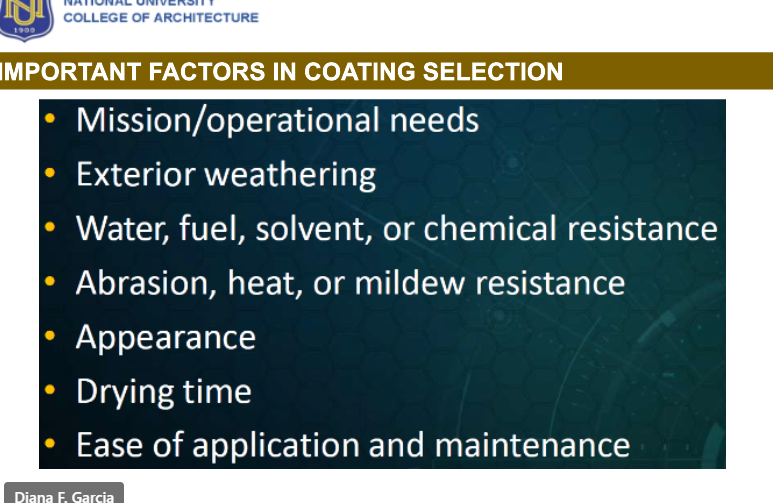
review
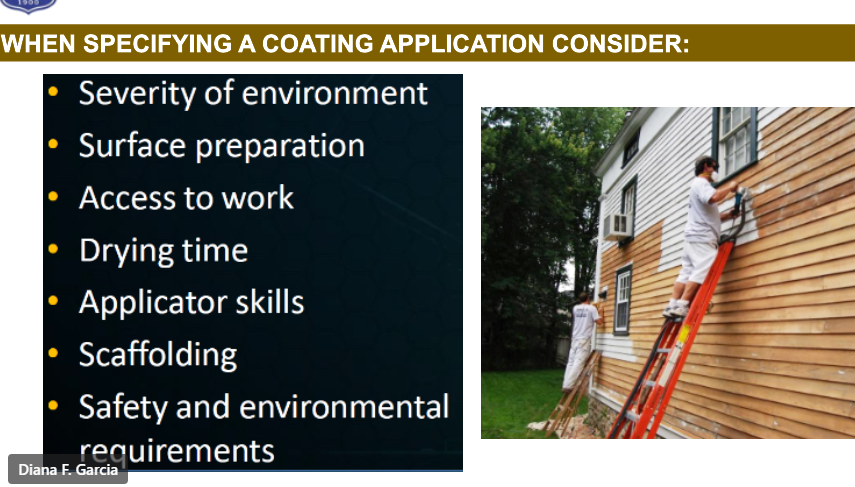
review
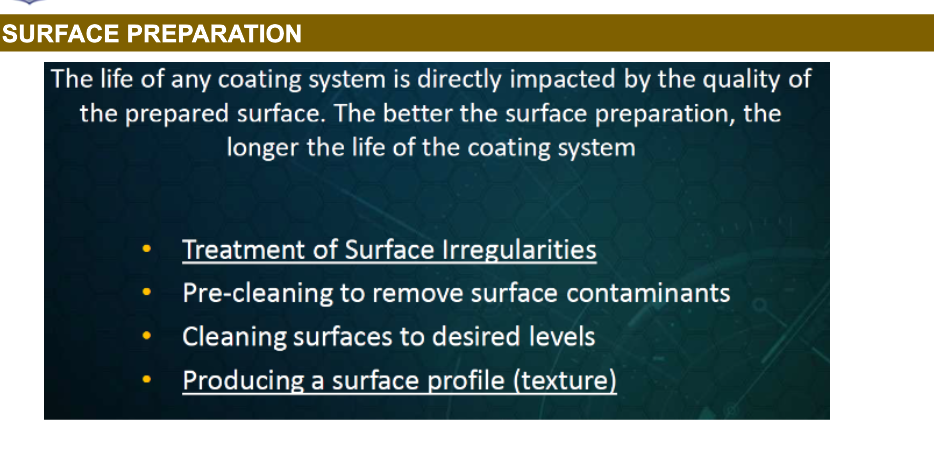
review
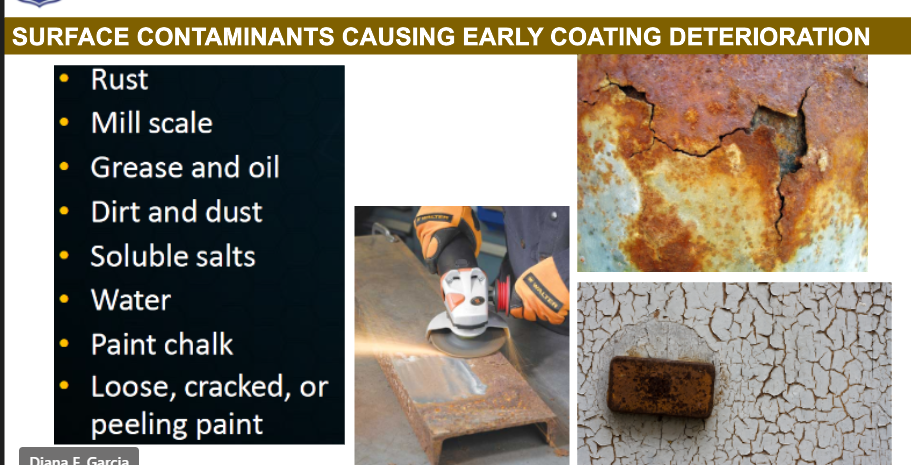
review
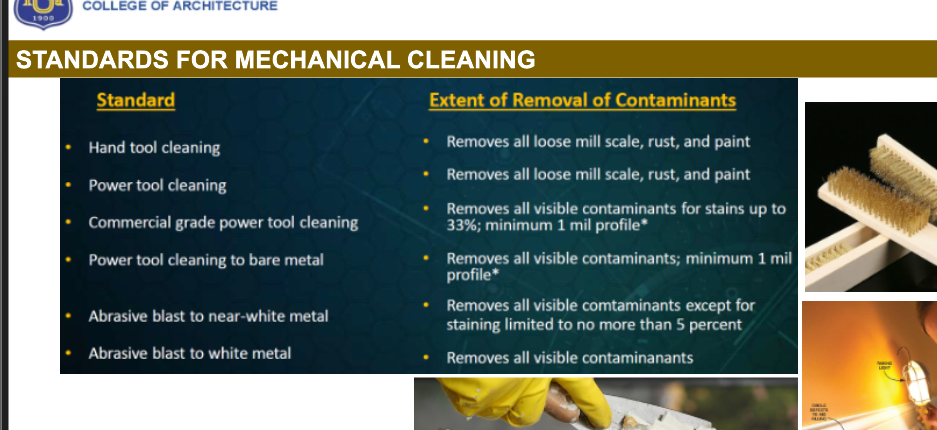
review
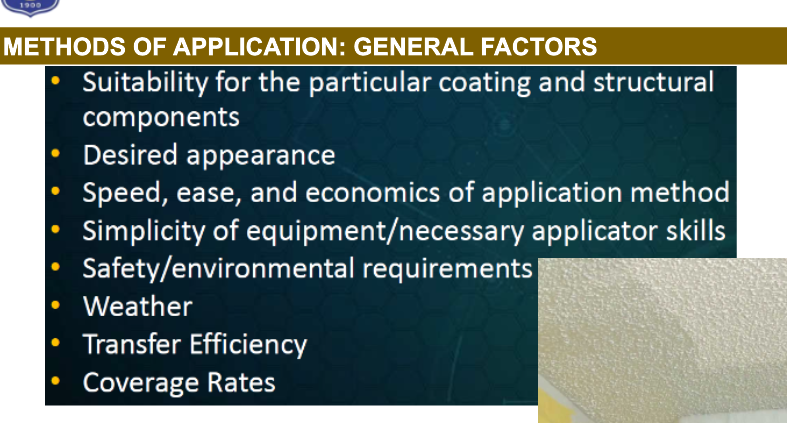
review
